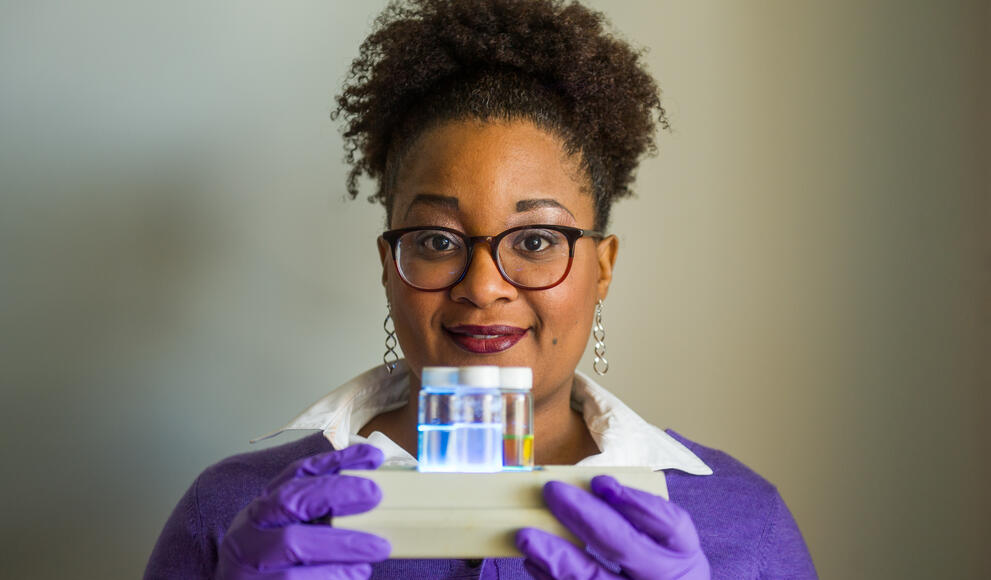BU Chemistry Professor Malika Jeffries-EL ’96 Encourages Wellesley Students to Persevere in the Lab and in Life

When Malika Jeffries-EL ’96 was a first-year at Wellesley, she knew she wanted to become a chemist and that nothing would dissuade her from that goal. “As a child, I had always been curious about why things behave the way they do and what would happen if you mixed various substances,” she said. “I was always reading and conducting experiments at home, with my mother’s encouragement.”
Her single-minded focus helped Jeffries-EL, who grew up in Brooklyn, become the first in her immediate family to attend college. She earned a Ph.D. from George Washington University, was an associate professor of chemistry at Iowa State University, and in 2012 received the American Chemical Society Women’s Chemists Committee’s Rising Star award.
Earlier this year, Jeffries-EL accepted a tenured position in the chemistry department at Boston University, where her research focuses on organic semiconductors. These materials combine the processing properties of polymers with the electronic properties of semiconductors. In other words, she is developing plastics to improve the efficiency of solar cells, lighting displays, and various electronics.
“Energy use is a big concern as more people own more electronic devices than ever before,” said Jeffries-EL. “Most American households have one or more computers, several cell phones, and an average of three TVs. Each of those devices needs power.”
Jeffries-EL hadn’t imagined herself working in this field as an undergraduate. Her interest in reducing energy use and harnessing light developed over time as she realized “that energy drives so much of what we do,” she said.
What has remained constant is her drive to develop her own potential and help others reach theirs, which was nurtured at the College. “My professors at Wellesley taught me that true champions do fail, they just don’t quit when they do,” she said. “I also learned that when you want to be good at something, you’ve got to work at it, rather than just rely on your natural aptitude.”
Those lessons were especially helpful after the unexpected death of her mother during her sophomore year. For the first time, Jeffries-EL found herself struggling with a chemistry course, and had to decide whether to continue pursuing her dream or opt for something easier.
“My mother had always been my biggest supporter and had always listened to my crazy ideas,” said Jeffries-EL, who persevered despite her grief. By the next year, her professors were encouraging her to pursue graduate work.
“Wellesley taught me that you never get a second chance to make a first impression,” she said. “I also learned good study tips and how to work like a scientist, finding the information and answers when I need them. That set me up for success, for sure.”
Now that Jeffries-EL is a professor herself, she urges students to fight for their dreams. “It’s not how you start that matters, it’s how you finish. If you want to achieve something, don’t back down,” she said. “And let your family help you through your struggles, even if you are a first-gen and they haven’t been where you are.”
Women often diminish their accomplishments, she said, and don’t always view themselves as positively as others do. “Even if you aren’t happy with your life just yet, remember how much you have achieved so far and that you are a role model for someone else,” she said.
